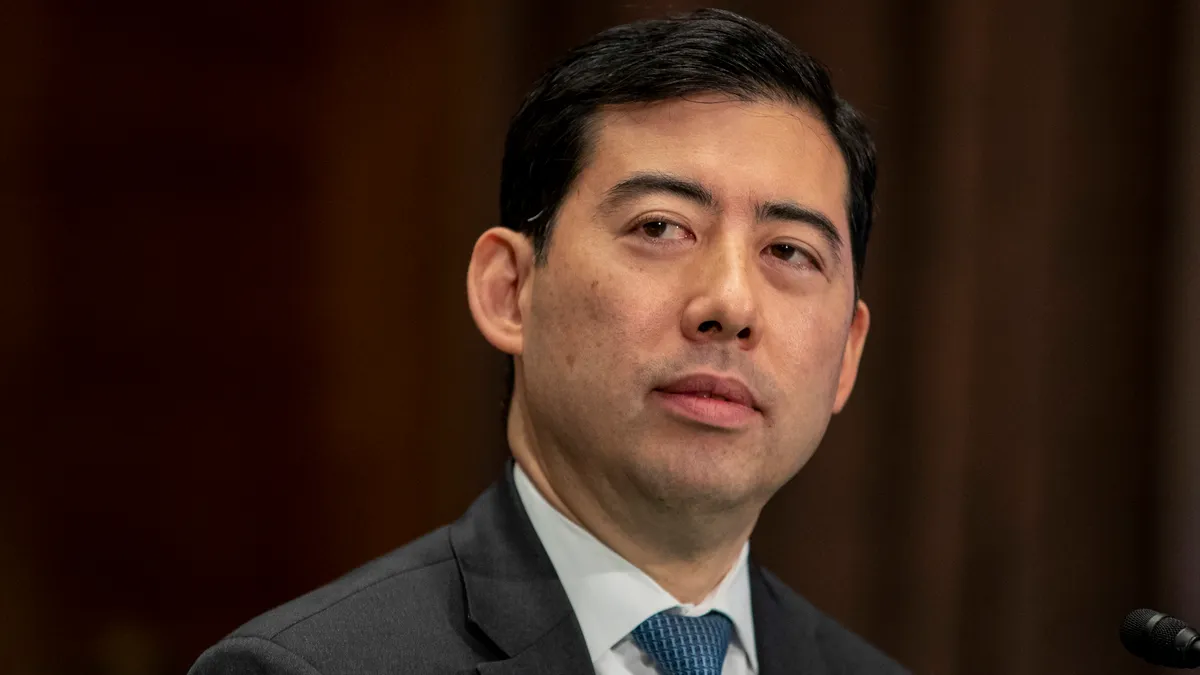The Office of the Comptroller of the Currency imposed a $434 billion asset cap on TD’s U.S. retail banking operations, the regulator and the bank announced Thursday.
The growth restriction comes in addition to $3.09 billion in penalties stemming from investigations into TD’s safeguards against money laundering, according to the Federal Reserve Board. The Fed, for its part, fined TD $123.5 million.
“TD Bank’s persistent prioritization of growth over controls allowed its employees to break the law and facilitate the laundering of hundreds of millions of dollars. The bank’s blatant risk management failures attracted illicit actors and are egregious and unacceptable,” said Acting Comptroller of the Currency Michael J. Hsu in a statement. “The OCC’s coordinated and comprehensive action, including the imposition of an asset cap, will ensure that the bank focuses on building proper controls commensurate with its risk profile.”
U.S. Justice Department agents found that millions of dollars tied to the illicit drug fentanyl funneled through the bank, The Wall Street Journal reported in May. Separately, a TD employee in Florida allegedly took bribes to let criminals send millions of dollars to Colombia, court documents show.
U.S. Attorney General Merrick Garland said Thursday that TD failed to monitor $18.3 trillion in customer activity, allowing three laundering networks to transfer hundreds of millions of dollars through TD accounts.
TD will pay $1.8 billion in penalties to the DOJ, while the Treasury Department’s Financial Crimes Enforcement Network said it will collect $1.3 billion from the bank.
The DOJ and FinCEN will install independent monitors to ensure TD’s compliance with the penalties. FinCEN expects its monitor to be in place for four years.
The Fed is requiring TD to establish a new U.S. office dedicated to remediating its AML deficiencies, and relocate to the U.S. the parts of its AML compliance program responsible for complying with U.S. law. The bank must also certify that sufficient resources and attention are allocated to fixing its AML woes prior to issuing any dividends or capital distributions; its board and management will also be subject to an independent review.
The penalty amount tracks with what TD has set aside. The bank said in August that it was prepared to dish out $3.57 billion in penalties. That encompasses the $3.09 DOJ and FinCEN total plus another $450 million TD set aside in April to cover what was revealed Thursday to be a fine by the OCC.
The asset cap applies only to TD’s U.S. retail banking division — meaning the bank’s other units, such as TD Securities, could still expand their balance sheets.
The asset cap carries with it an open timeline. The Federal Reserve, for example, capped Wells Fargo’s assets at $1.95 trillion in February 2018 — in response to the bank’s 2016 fake-accounts scandal — and has yet to lift the restriction. Just this month, Sen. Elizabeth Warren, D-MA, urged the OCC to issue an asset cap against Citi over the bank’s long-running tech-modernization issues.
An asset cap for TD — in the U.S., anyway — will likely put a pin in its plan to open 150 branches by 2027, mostly in the southeast. TD’s CEO, Bharat Masrani, acknowledged last month that the bank’s branch expansion plan has slowed “quite dramatically” in the face of the AML issues.
The impact of Thursday’s penalties against TD is expected to be significant. Analysts at Wolfe Research estimate that the asset cap imposed on Wells has cost the bank $540 billion in deposit growth, Reuters reported this spring. At its 1% return on assets, the Wells would be generating $8 billion more in earnings per year; and LSEG estimates the bank would have gained $90 billion in additional market capitalization at today’s valuation.
While Wells’ balance sheet has been limited, those at JPMorgan, Bank of America, PNC and U.S. Bank have ballooned 40% since 2018, Reuters reported.
TD’s AML shortcomings were rumored to be why the bank’s proposed acquisition of Memphis, Tennessee-based First Horizon fell apart. Months after the deal’s termination, news outlets reported that TD executives knew as early as November 2022 that U.S. agencies, including the DOJ, had found AML deficiencies serious enough to put the deal at risk of rejection.
TD’s U.S. entity pleaded guilty to criminal charges to resolve the DOJ investigation, the FRB said.
"We have taken full responsibility for the failures of our U.S. AML program and are making the investments, changes and enhancements required to deliver on our commitments. This is a difficult chapter in our Bank's history. These failures took place on my watch as CEO and I apologize to all our stakeholders," Masrani said. "I want to thank our colleagues, who continue to demonstrate their dedication and who play an important role in preventing criminal activity."
TD has seen turnover this year in multiple compliance-related posts. Questions dogged the bank for months, though, as to whether there would be changes higher in the leadership chain. The bank announced last month that Masrani would retire in April and be replaced by TD’s Canadian personal banking chief, Raymond Chun.
That choice, too, may work in TD’s favor, as Chun’s expertise lies in a market where the bank can continue to grow.
Chun is set to become the bank’s chief operating officer Nov. 1 and move into the CEO role after Masrani.
“We recognize the seriousness of our U.S. AML program deficiencies and the work required to meet our obligations and responsibilities is of paramount importance to me, our senior leaders, and our boards,” Masrani said in August.





















